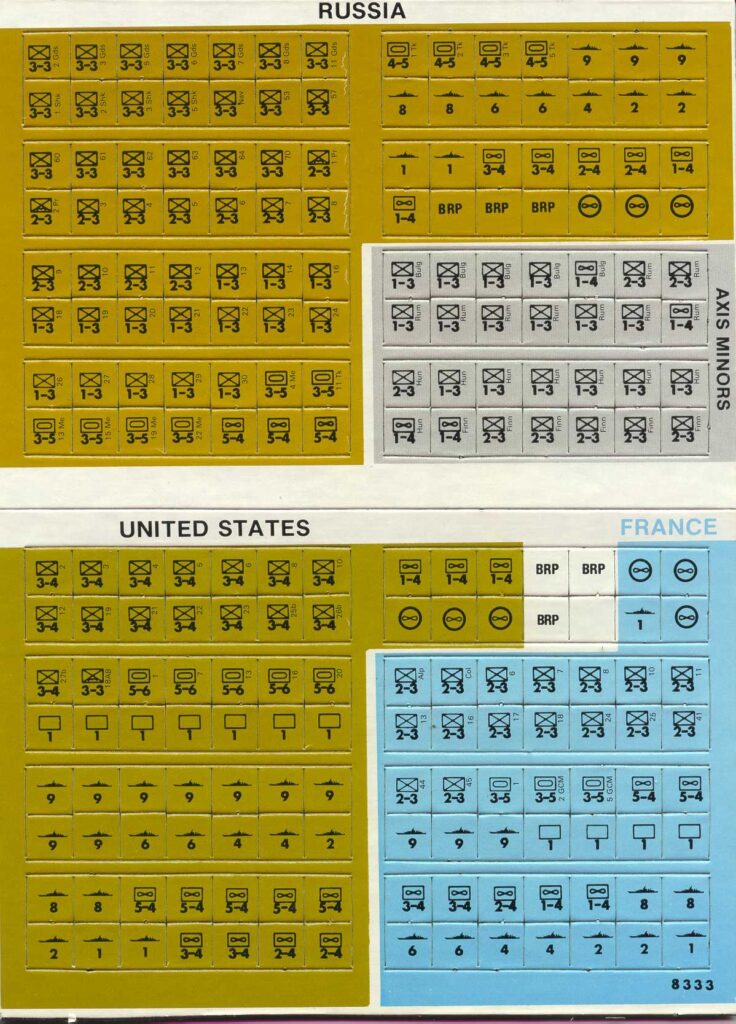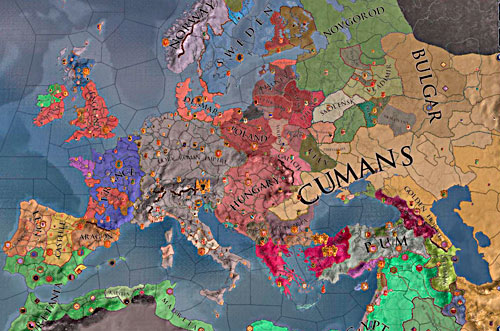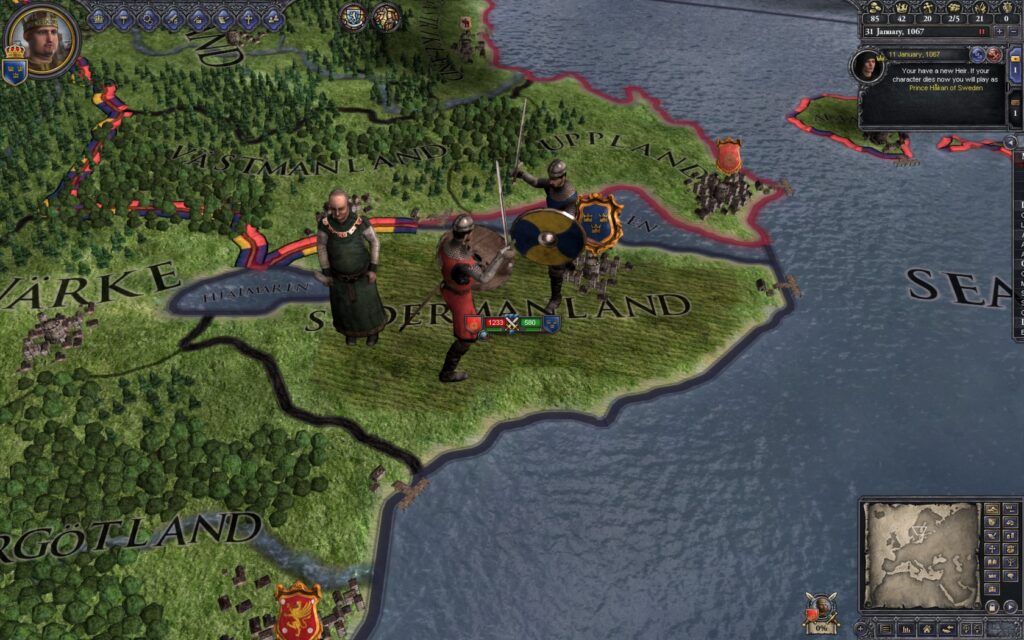
Strategy games are a relatively niche genre now (not too obscure, as big titles do come out occasionally, but largely outside of the big budget AAA circle, and focused on genre enthusiasts) but there was a time when they were a big part of the mainstream—many gamers have fond memories of playing Starcraft, Age of Empires or one of the Civilization games.
Of course, most of those games had a strong military focus, simple economy and many abstractions from how politics, war and conquest look in real life. All those things were necessary to make to make the games exciting, fun and relatively accessible to the newcomers … or were they?
People who play grand strategy and political simulation games would disagree. After all, isn’t it fun to play the role of a ruler—be it a WWII-era leader, a medieval king, or somebody else entirely—who not only has to fight wars against his enemies but also make sure that people are happy, food is plentiful, and the country doesn’t lag technologically? Isn’t it exciting to learn the intricacies of modern or historical politics presented as accurately as possible, without too many simplifications and abstractions? Sure, the graphics usually aren’t very good, the multiplayer is unbalanced (it’s generally not possible to be historically accurate and balanced—after all, the war between Italy and Ethiopia in 1935 was far pretty uneven) and learning such games can be a big time investment, but it’s all worth it. It’s not quite like being the great man of history but it’s the next best thing.
What is grand strategy?
The grand strategy genre of video games is not easy to define. It has origins in a similarly named genre of board games (more on that later) but there are differences between what defines the most notable computer grand strategies and what defines the most notable tabletops of that genre. Thus, the best course of action here will be finding the common elements in popular grand strategy video games.
Grand strategies are complex and detailed 4X (explore, expand, exploit, and exterminate) titles. They’re usually historical games with a strong focus on accuracy. As a result, they’re almost never panhistorical like Civilization or Empire Earth—modelling detailed and accurate gameplay for different eras in a single engine would not be an easy task. Instead, they focus on a single period. (What exactly constitutes a “period” varies; some grand strategies have a large scope and take place over hundreds of years, while others are much more focused, making you participate in a single large-scale conflict like the War of the Roses or one of the World Wars).
Players take control of a nation (or, in some cases, a faction or a dynasty) and are forced to micromanage its economy, politics and military. The games are usually on the PC due to the fact that it’s easier to control such a complex system with mouse and keyboard than with a controller. Grand strategies can be turn-based, or real-time with pause. They can have set victory conditions but more often than not are fairly open-ended with a large, non-linear campaign that is not divided into different missions. They’re usually played on a real world map.
The political simulation genre is closely related to grand strategy, with a few marked differences. Obviously, the focus is on law, politics and economy and the military aspect is usually downplayed. The setting for those games is usually contemporary, and the player assumes the role of a single political leader who not only has to control the country but also stay in power and avoids assassination. Usually, player’s decisions are not final as they can be changed by the parliament.
The diplomatic table

Tabletop grand strategies are board wargames focusing on strategy on a national level as opposed to smaller scale tactics. Those games are focused on the military but they often also feature mechanics related to the economy (usually simplified to simple resource management), diplomacy and politics. The level of complexity and realism varies; in some of them, luck might even be a factor as some events may be determined by drawing cards or rolling dice.
The tabletop grand strategies to have the biggest influence on their computer counterparts are probably Rise and Decline of the Third Reich (a realistic WWII game, the art style of which clearly influenced video games like Hearts of Iron) and Europa Universalis. Yes, EU used to be a board game, and an incredibly complex one at that. Playing a big EU campaign could take weeks as the players negotiated and then took turns fighting wars, colonizing the New World, expanding their economy and deciding the fate of their rulers. The EU board game was even more complex and extensive than its computer counterpart.
A brief history of computer grand strategies and political simulators
In the 1980s, grand strategy games were usually about the biggest geopolitical issue from that time: the Cold War. The trend was started by Geopolitique 1990 (released in 1983) in which the player took control of the United States and tried to gain advantage over the Soviet Union through diplomatic means—and if that wasn’t possible, he could always start a war against them. Two years later, Chris Crawford created a similar game called Balance of Power, in which the player is given the additional task of avoiding nuclear war. Another notable example is Shadow President, which also included political simulation elements by forcing the player to keep track of his popularity so that he can get re-elected. Cold War grand strategies were made until the 1990s. Unfortunatelly, the genre seems dead now.
The first historical grand strategy video games were made by Koei Tecmo, a Japanese developer now known of their decidedly non-strategic Dynasty Warriors series. Before focusing on action games, they created Nobunaga’s Ambition, a game set in feudal Japan, and the Romance of the Three Kingdoms series, which is loosely based on the classic novel by the same title and set in 3rd-century China. Other than that (and a few American titles like the classic WWII game, Clash of Steel), this particular genre was mostly dominated by European developers: Paradox Interactive, the Swedish studio behind Europa Universalis, and Creative Assembly, a British company that developed Total War. Games made by those developers have a distinct style. Paradox are known for their complex real-time strategies played over a map divided into regions, while Total War series mixes turn-based strategy with real-time combat.
The political simulation genre is niche even compared to grand strategies. Aside from the aforementioned Cold War games, and games focusing on election campaigns as opposed to governing the country, the most popular examples are from the 21st century, the Democracy and Rulers of Nations series. The Democracy games are relatively well-made, focusing on the domestic policies of various countries, and staying popular among different demographics. The Rulers of Nations games are very ambitious, with a complex economy, diplomatic, military and legal mechanics, and a lot of real-world data but they simply don’t work; even on the lowest difficulty and aggressiveness settings, the players will have to deal with terrorist attacks in relatively peaceful countries, protests becoming violent after small tax reforms, and completely riddiculous wars blowing up all around the world. (Japan declaring war on Russia in 2014 is not realistic.)
So you want to play a Paradox game?

Nowadays, the term ‘grand strategy video game’ is almost synonymous with Paradox Interactive—and not without a reason. A lot of work that went into their titles, the historical accuracy of which is amazing. (That is not to say they don’t have their mistakes—it’s just that nobody has managed to make such a detailed strategy game more historically accurate.) If you want to try them, here are a few ideas for getting into those rather inaccessible titles.
But before that, it’s important to remember one thing: be cautious when buying Paradox games at launch. They’re getting better at it but the games are still pretty buggy when released—it might be inevitable given the complexity, and the patches get released frequently, but it can ruin your first experience.
Newer players will generally want to start with the most popular Paradox game, Crusader Kings 2, preferably with all the major expansion packs. It’s a medieval strategy game in which players control not countries but dynasties. The game is not extremely hard but there’s a lot to learn here. It might be a good idea to start small, maybe even as someone’s vassal, and gradually learn the mechanics of war, intrigue, diplomacy (including personal relationships—pursue advantageous marriages), economy, law, religion, and technology. Keep in mind that the game is very non-linear, and even getting conquered might not mean game over. There are many things to do and many ways of doing them—becoming a crusader and driving Arabs out of Jerusalem is a valid gameplay choice but so is conquering half of Europe for your reformed Slavic pagan empire (my favourite pastime), getting rich as a doge [Editor’s note: no, not that kind] of Venice, bringing back Zoroastrianism, or simply spending your money on feasts and hunts.
Another good choice for a first game is Hearts of Iron 2, or some of the standalone titles based on its engine like Arsenal of Democracy or Darkest Hour. Those games are less extensive; they’re heavily focused on military (they’re set during WWII or, in the case of DH, both World Wars) and require the use of different types of units and the ability to manage army, navy, and aviation. The games are difficult but manageable, especially if you pick a powerful country like the USA, Germany, or Russia, and they don’t require as much micromanagement as Hearts of Iron 3.
Players accustomed to other Paradox titles might try their hand at Europa Universalis and Victoria games, which are rather complicated, especially for the newcomers. Fans of Civilization might try to get their hands on as many of those games as they can, and get official and third-party save converters. This way, they can string many games together into one extremely long campaign.
Beyond
Despite the extremely disappointing Rome 2, the Total War series is definitely worth checking out. Other interesting games are TripleA (a computer implementation of Axis & Allies known for its ease of modding, which resulted in the creation of many different maps and rulesets) and the old Clash of Steel, which are both reminiscent of grand strategy board games. For a borderline grand strategy experience, one can also try Rhye’s and Fall of Civilization, a Civilization 4 mod with increased realism played on a real world map.
Gamers interested in political simulation should definitely check out Shadow President and Democracy 3. Games from the Rulers of Nations series might be fun for a while as well, but they’re just too buggy to be enjoyed seriously.
The niche appeal of grand strategy games and the difficulty of their development leads to the market being relatively small, with not many worthwhile titles released over the years. Fortunatelly, a good grand strategy game has a lot of replay value—just ask all those people with over a hundred hours spent in Crusader Kings 2.
